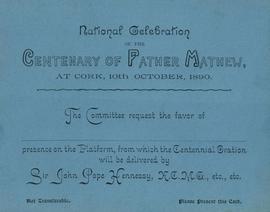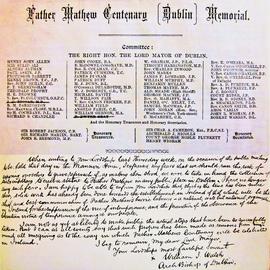• Flier from the Father Mathew Centenary Committee seeking subscriptions for a fund for the completion of Holy Trinity (Father Mathew) Memorial Church, Cork. The flier includes a list of subscribers and the amounts given to the fund. March 1889. Printed, 1 p.
• Copy programme for a ‘Grand Vocal and Instrumental Concert in aid of the Father Mathew Centenary Celebration’ performed by the Cork Amateur Orchestral Society in the Opera House, Cork, on 9 Oct. 1889. The programme includes a recital of the Centenary Ode by Fr. Michael O’Flynn, CC, Saint Peter and Saint Paul’s Church, Cork. Copy print, 1 p.
• Copy obedience to Br. Masseo Hyland OSFC (d. 18 May 1908) allowing him to travel to the United States with Fr. Mathew O’Connor OSFC to receive subscriptions for the celebrations of the centenary of the Father Theobald Mathew and the completing of the Church of the Most Holy Trinity in Cork …’. The obedience is signed by Fr. Paul Neary OSFC, Provincial Minister, and is dated at Rochestown, 18 Oct. 1889. With a copy of a similar obedience (in Latin) to Fr. Mathew O’Connor OSFC. Manuscript, 3 pp.
• Notes re the Fr. Mathew ephemera and relics used in the Centenary Exhibition in 1890. The exhibited items included:
A banner painted by a sister from the South Presentation Convent.
A lock of Father Mathew’s hair which was loaned by Frank Driscoll, Garrick Street, Covent Garden, London. It is affirmed that ‘it was given to a Mr Regan, a devoted follower of Fr. Mathew, a few months before he died’.
A pair of heavy silver spectacles.
Temperance medals and cards including ‘the first medal sold in Cork by Fr. Mathew – sold to Wm. Kelly, and sent in by his daughter, Mrs Daly of Evergreen Street’.
A bible lent by Mrs Donegan, Monkstown. It had been given to Fr. Mathew by Mrs Donegan’s Aunt.
The file also includes notes by Fr. Nessan Shaw OFM Cap. on the wider centenary celebrations of Fr. Mathew’s birth in 1890. Many of the extracts appear to have been taken from the 'Cork Examiner'. Manuscript and typescript, 9 pp.
• Copybook containing extracts from 'The Standard' (14 Oct. 1889) and the 'Freeman’s Journal' (25 Oct. 1889) reporting on a meeting of a committee organising the commemorations of the centenary of the birth of Fr. Mathew. The article in 'The Standard' reads ‘As a rule the inhabitants of the sister island find it anything but easy to discover a common ground on which they may meet each other without fear of dispute. The names of famous Irishmen are usually rather emblems of discord than national rallying cries. According as the great men in Irish history were Protestant or Catholic loyal or disloyal men of the North, or men of the South so did they receive the sympathy or dislike of the various sections of the population. Hardly one of them is capable of uniting even for a moment the sentiment of the whole country … . The zealous and single-hearted priest whom the Irish race with its love of picturesque phraseology knows as the “Apostle of Temperance” is one of the very few persons whom the whole country agrees to honour. That Father Mathew was a brave and good man, and that he did his best to succour and to raise the peasantry is a fact which is never disputed in Ireland’. Extensive reference is also made to the plan to erect a statue on O’Connell Street commemorating the temperance campaigner. Manuscript, 23 pp.
• 'The Father Mathew Centenary / by John Francis Maguire / 1890' (Cork: Irish Temperance League, 1890). Printed, 8 pp.
• An article from 'The Shamrock' on the unveiling of the statue of Fr. Theobald Mathew OSFC on O’Connell Street, Dublin. It reads ‘Father Mathew needs no statue to perpetuate his memory … but it is only proper that in the Capital of his Nation a grateful people should testify by some public memorial their recognition of his services, and should set his image in their streets as a witness of their gratitude. … Father Mathew would never have been suspected of being a clergyman from his dress. He wore no clerical coat or hat. He dressed like a gentleman of the time in a frock coat, hessian boots and a tall hat. Yet it was as a Capuchin Friar he did his marvellous work, and it is quite appropriate that in the statue which has been just unveiled in Dublin he should appear in the habit of that order. The statue is a fine work of art. It is by Irish hand, and the sculptor, to whom we offer our congratulations, is Miss Mary Redmond’. The article includes a sketch of the statue and of Thomastown Castle, Fr. Mathew’s birthplace. Feb. 1893. Printed, 4 pp.


